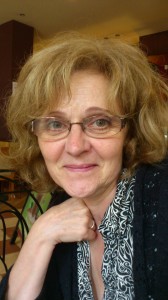This is what graduates from the previous MA programmes Cultural Interactions: British and American Perspectives and English in Modern Communication have said about their experience:
“After having two bachelors and a master degree, I have to admit that my Master in Cultural Interactions at the Department of English and American Studies at Sofia University was one of the most interesting things I have ever done in my life. In simple words, it made me see the world with completely different eyes. And this is not only because of the extremely intriguing and multi-dimensional material we had to study (from post-colonial to cyber studies) but because of the way it was taught by the specific respectable professors who gave us the opporunity to discover aspects of life, society, and even psychology, which other people don’t even suspect they exist. Good luck!!!”
Martha Moissidou (Greece), MA “Cultural Interactions”
“In my view the MA programme in Cultural Interactions serves as an efficient transition from the BA degree in English at Sofia University to the professional world with its valuable insights into major global socio-cultural processes and phenomena, such as the impact of US postmodernism, the contemporary consequences of British colonialism, the growing importance of the role of gender worldwide. For me personally, the programme was a mind-opener: its variety of projects, case studies and in-class discussions helped me upgrade what I already knew as well as improve my practical skills.
The ultimate test for me was my risky ambition to combine this humanities-oriented programme with an MA in Business Studies at the University of Sheffield. It turned that that my MA at Sofia University stood me in good stead for an in-depth understanding of the culture of consumption and the co-functioning of the processes of globalization and localization. The risk was worth taking!”
Nadezhda Nikolova, MA in Cultural Interactions
“When I chose the MA Programme Cultural Interactions, I was only thinking of improving my qualifications and of getting yet another certificate in English and American Studies into the bargain. I never thought about it in terms of my future career. The class discussions of literature, cinema, and media aroused my interest in postmodernism and the study of popular culture and everyday life, and even gave me confidence to participate in an international students’ conference at the University of Lille-3, France. Afterwards I spent six months as an Erasmus student at Saarbrücken University, working on my MA thesis.
This Programme gave me an orientation I did not expect, as well as a strong motivation to continue my studies – now I am a PhD student in cultural studies at the Dept. of English and American Studies, University of Sofia. I am glad and proud of what I have done so far. “
Alexander Trendafilov, MA in Cultural Interactions
As part of the MA Programme in Cultural Interactions, I had the chance to compare our standards of education with the ones at two other European universities. Lille-3 University gave me the opportunity to participate in an international conference and enjoy my first “public performance”. I was so pleased that my presentation was well-accepted and provoked a serious discussion with professionals in film studies. The following year I continued my studies in English and American culture as an Erasmus student for two semesters at the University of Zaragoza. I liked it so much: I was offered more interactive forms of study and a greater dose of individual work online. Yet, this experience made me appreciate what the Program at Sofia University had already given me – a greater focus on theoretical approaches, combined with intensive discussions in class, in a word, a solid basis for the furthering of my analytical, critical and communicative skills.
Marta Peneva, MA in Cultural Interactions, still writing her MA thesis
The Department of English and American Studies at Sofia University feels like a really vibrant and forward-thinking place and I’m really glad I chose to do my MA here. As an EFL teacher it’s been a wonderful experience getting to know people and studying here. I’ve also had the chance to present my master’s dissertation at the international IATEFL conference, which was a great experience.
The programme is extremely useful, especially for those who would like to study or do research in comparative literature and general linguistics. It stimulates an independent and critical approach to the study of language and literature. I highly recommend it as it offers a superb education. Lastly, I would like to take this opportunity to thank all the academic staff who have been encouraging and helpful, and students who have been friendly and supportive.
Osman Bedel, MA in English in Modern Communication

Lille-3 conference Gender/Genre, June 2009.


